Related Research Articles

Lincoln Theodore Monroe Andrew Perry, better known by the stage name Stepin Fetchit, was an American vaudevillian, comedian, and film actor of Jamaican and Bahamian descent, considered to be the first black actor to have a successful film career. His highest profile was during the 1930s in films and on stage, when his persona of Stepin Fetchit was billed as the "Laziest Man in the World".
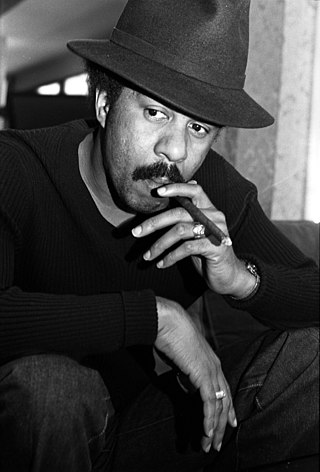
Richard Franklin Lennox Thomas Pryor Sr. was an American stand-up comedian and actor. He reached a broad audience with his trenchant observations and storytelling style, and is widely regarded as one of the greatest and most important stand-up comedians of all time. Pryor won a Primetime Emmy Award and five Grammy Awards. He received the first Kennedy Center Mark Twain Prize for American Humor in 1998. He won the Writers Guild of America Award in 1974. He was listed at number one on Comedy Central's list of all-time greatest stand-up comedians. In 2017, Rolling Stone ranked him first on its list of the 50 best stand-up comics of all time.
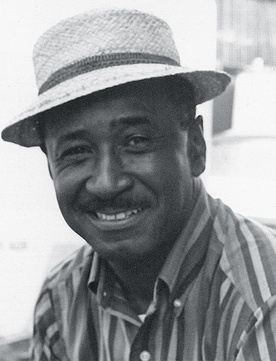
Albert L. Murray was an American literary and music critic, novelist, essayist, and biographer. His books include The Omni-Americans, South to a Very Old Place, and Stomping the Blues.

LaWanda Page was an American actress, comedian and dancer whose career spanned six decades. Crowned "The Queen of Comedy" or "The Black Queen of Comedy", Page melded blue humor, signifyin' and observational comedy with jokes about sexuality, race relations, African-American culture and religion. She released five solo albums, including the 1977 gold-selling Watch It, Sucker!, and collaborated on two albums with the comedy group Skillet, Leroy & Co. As an actress, Page is best known for portraying the Bible-toting and sharp-tongued Esther Anderson on the popular television sitcom Sanford and Son, which aired from 1972 until 1977. Page reprised the role in the short-lived television shows Sanford Arms (1976–1977) and Sanford (1980–1981). She also costarred in the 1979 short-lived series Detective School. Throughout her career, Page advocated for fair pay and equal opportunities for black performers.
Theatre Owners Booking Association, or T.O.B.A., was the vaudeville circuit for African American performers in the 1920s. The theaters mostly had white owners, though about a third of them had Black owners, including the recently restored Morton Theater in Athens, Georgia, originally operated by "Pinky" Monroe Morton, and Douglass Theatre in Macon, Georgia owned and operated by Charles Henry Douglass. Theater owners booked jazz and blues musicians and singers, comedians, and other performers, including the classically trained, such as operatic soprano Sissieretta Jones, known as "The Black Patti", for black audiences.

Thomas Dilward was an entertainer who appeared in blackface minstrel shows from 1853 until the early 1880s under the name Japanese Tommy. He was also sometimes billed as "The African 'Tom Thumb'" and the "African Dwarf Tommy". Dilward is one of only two known African-Americans to have performed with white minstrel companies before the American Civil War.
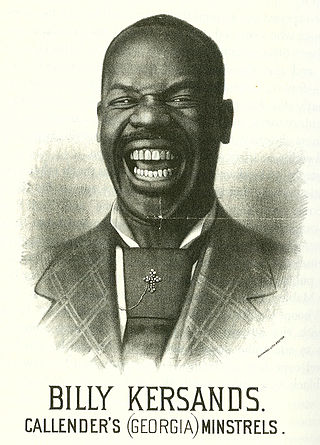
Billy Kersands was an African-American comedian and dancer. He was the most popular black comedian of his day, best known for his work in blackface minstrelsy. In addition to his skillful acrobatics, dancing, singing, and instrument playing, Kersands was renowned for his comic routines involving his large mouth, which he could contort comically or fill with objects such as billiard balls or saucers. His stage persona was that of the dim-witted black man of the type that had been popularized in white minstrel shows. Modern commentators such as Mel Watkins cite him as one of the earliest black entertainers to have faced the dilemma of striking a balance between social satire and the reinforcement of negative stereotypes.
Charles Callender was the owner of blackface minstrel troupes that featured African American performers. Although a tavern owner by trade, he entered show business in 1872 when he purchased Sam Hague's Slave Troupe of Georgia Minstrels.
Sam Hague was a British blackface minstrel dancer and troupe owner. He was a pioneering white owner of a minstrel troupe composed of black members, and the success he saw with this troupe inspired many other white minstrel managers to tour with black companies.

Butterbeans and Susie were an American comedy duo comprising Jodie Edwards and Susie Edwards. They married in 1917, and performed together until the early 1960s. Their act, a combination of marital quarrels, comic dances, and racy singing, proved popular on the Theatre Owners Booking Association (TOBA) tour. They later moved to vaudeville and appeared for a time with the blackface minstrel troupe the Rabbit's Foot Company.

William Best, known professionally as Willie Best or Sleep 'n' Eat, was an American television and film actor.

Hearts in Dixie (1929) starring Stepin Fetchit was one of the first all-"talkie", big-studio productions to boast a predominantly African-American cast. A musical, the film celebrates African-American music and dance. It was released by Fox Film Corporation just months before the release of Hallelujah!, another all-black musical by competitor Metro-Goldwyn-Mayer. The director of Hearts in Dixie was Paul Sloane. Walter Weems wrote the screenplay, and William Fox was producer.

Judge Priest is a 1934 American comedy film starring Will Rogers. The film was directed by John Ford, produced by Sol M. Wurtzel in association with Fox Film, and based on humorist Irvin S. Cobb's character Judge Priest. The picture is set in post-reconstruction Kentucky and the supporting cast features Henry B. Walthall, Hattie McDaniel and Stepin Fetchit. It was remade by Ford in 1953 as The Sun Shines Bright.

Steamboat Round the Bend is a 1935 American comedy film directed by John Ford, released by 20th Century Fox and produced by Fox Film Corporation, based on the 1933 novel of the same name by author Ben Lucien Burman. It was the final film made by star Will Rogers and was released posthumously, a month after he was killed in an airplane crash on August 15, 1935.

A Tough Winter is a 1930 Our Gang short comedy film directed by Robert F. McGowan. It was the 99th Our Gang short to be released.

Francine Everett was an American actress and singer.

The Embassy Five Theatre was a Broadway theatre at 1547 Broadway in Times Square, Manhattan, New York City from 1909 until 1982, when it was torn down. It was originally known as the Gaiety Theatre, becoming the Victoria Theatre in 1943; the theater was known as the Embassy Five Theatre for the last two years of its existence.
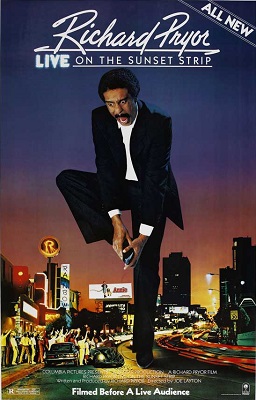
Richard Pryor: Live on the Sunset Strip is a 1982 American stand-up comedy film directed by Joe Layton. The film stars and produced by Richard Pryor, who also writer with Paul Mooney. The film was released alongside his album of the same name in 1982, and the most financially lucrative of the comedian's concert films. The material includes Pryor's frank discussion of his drug addiction and the night that he caught on fire while freebasing cocaine in 1980.
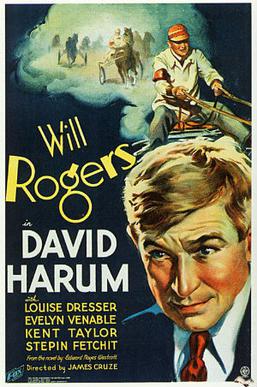
David Harum is a 1934 American comedy film directed by James Cruze and written by Walter Woods. The film stars Will Rogers, Louise Dresser, Evelyn Venable, Kent Taylor, Stepin Fetchit, Noah Beery, Sr. and Roger Imhof. The film was released on March 3, 1934, by Fox Film Corporation.
African American comedy has had a substantial role in American culture from minstrel shows, vaudeville, blackface, and coon songs to some of the world's most popular comedians, shows and filmmakers.
References
- Dancing with Strangers (1998) Simon & Schuster
- The Alicia Patterson Foundation
- Google Search
- The New York Times archives (1965-1995)
- Colgate University
- Contemporary Authors Online (2007)
- A & E Biography of Richard Pryor
- Amazon.com (Books)
- Maynard Institute Biography
- Mel Watkins, English Faculty, Colgate University